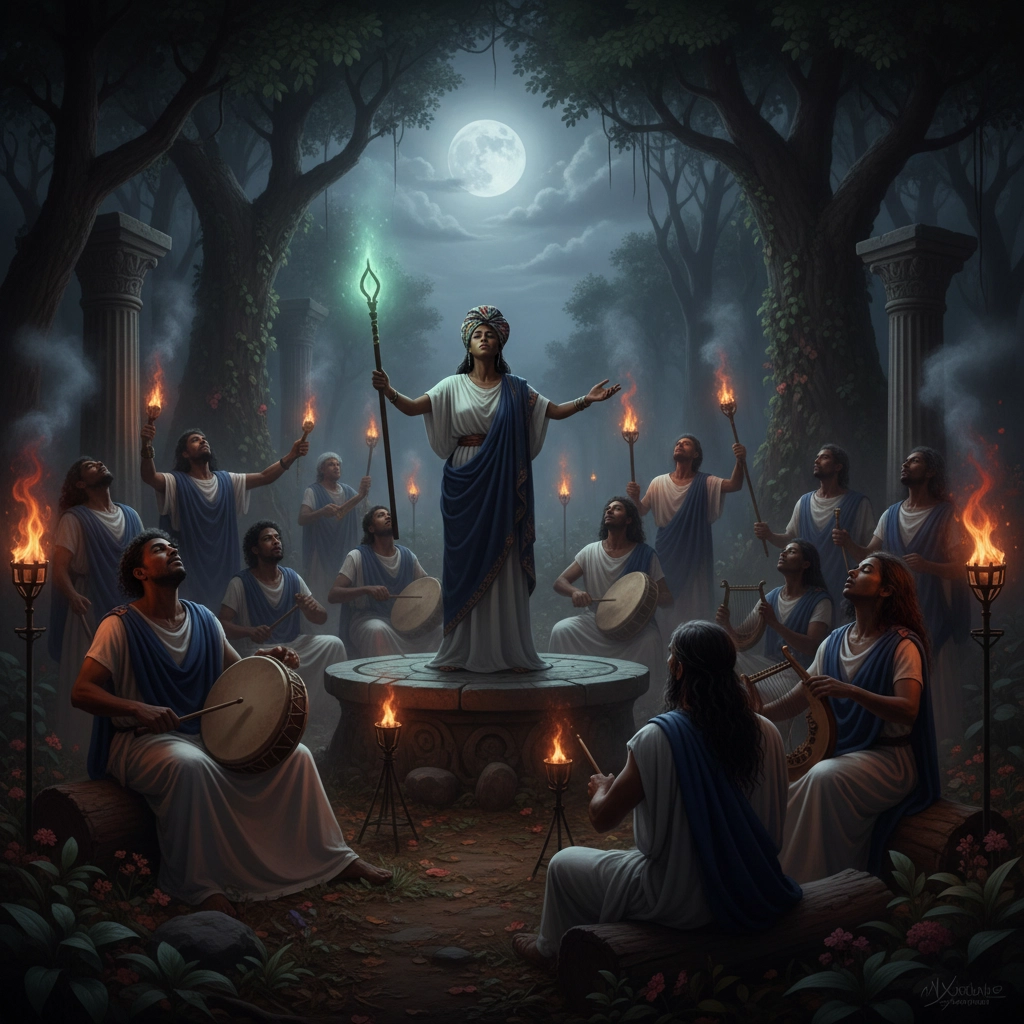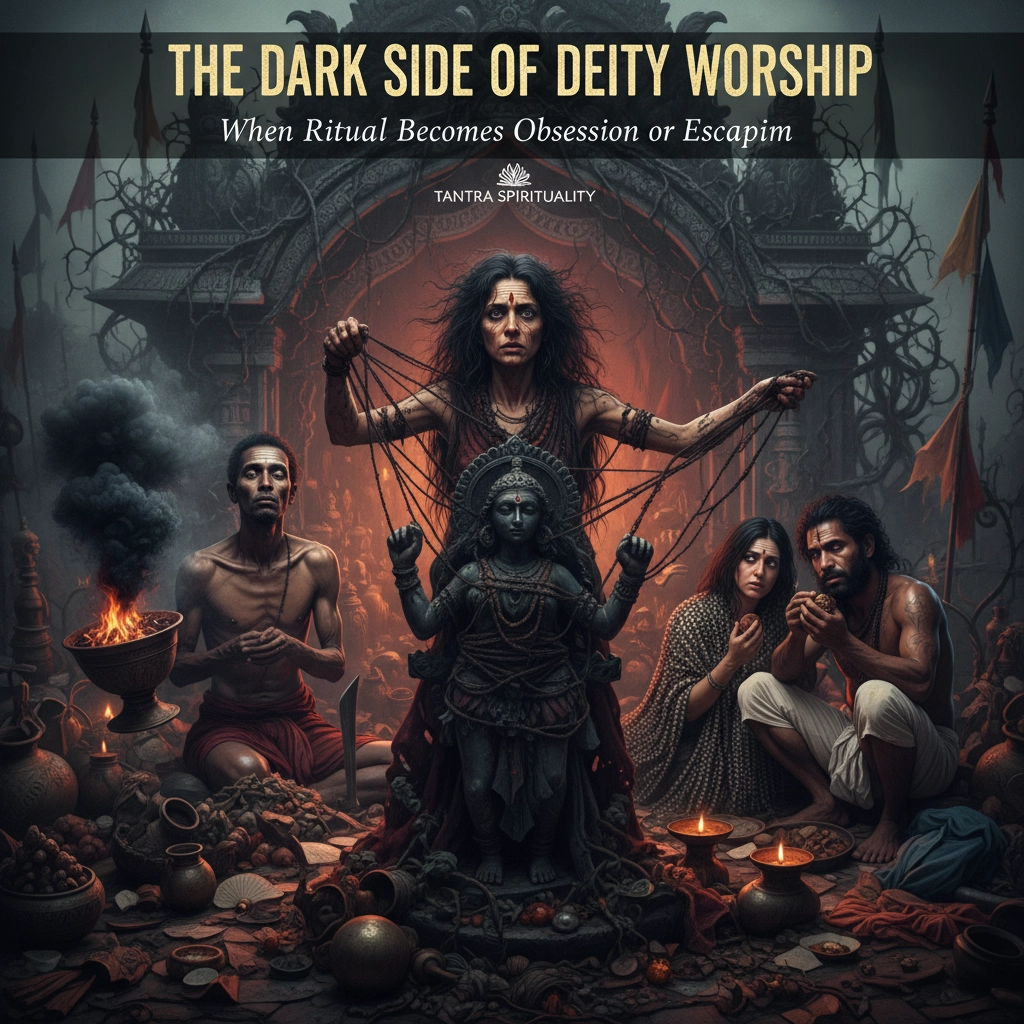Let's talk about something most spiritual teachers won't touch: when devotion goes wrong.
You know that feeling when your morning puja becomes so rigid that missing it ruins your entire day? Or when you're spending hours researching the "perfect" way to honor your chosen deity while your bills pile up and relationships crumble? Yeah, that's what we're diving into today.
Deity worship can be incredibly healing and transformative. But like anything powerful, it can also become a spiritual trap that keeps you stuck in cycles of dependency, escapism, or obsession. And nobody's talking about it.
Who Is Ganga Maa?
Since you asked: Ganga Maa is the goddess embodying the sacred Ganges River in Hindu tradition. She's revered as the divine mother who purifies sins and grants moksha (liberation). Devotees believe her waters can wash away karma, and millions make pilgrimages to bathe in the Ganges.
But here's where it gets tricky: Ganga Maa worship can demonstrate both healthy devotion and problematic attachment. Some devotees develop such intense reverence that they refuse to use any water but Ganges water, even for cooking. Others spend life savings on repeated pilgrimages while neglecting family needs. The line between devotion and obsession? It's thinner than you think.

When Sacred Becomes Obsessive
The research is clear: deity worship starts as psychological comfort and spiritual connection, but it can morph into dysfunction when we use it to avoid real-world problems or when devotion consumes our capacity for rational thought.
Here's what healthy deity worship looks like: You feel supported, connected to something greater, and inspired to live better. You pray, you offer devotion, you feel grateful.
Here's what obsessive deity worship looks like: You can't function without specific rituals, you're spending money you don't have on spiritual items, you're avoiding difficult conversations or decisions because "the goddess will handle it," or you're isolating from friends who don't share your beliefs.
The difference? Healthy worship enhances your life. Obsessive worship replaces your life.
Ancient Warnings We Ignored
This isn't new. Ancient Greek worship of Dionysus involved orgiastic rituals that deliberately induced altered states through spirit possession. Plato called it "telestic madness": a divine gift that could be transformative or destructive.
These rituals happened at night in secret. Participants would "step outside of their human state and cross into the animal and divine worlds." Sounds spiritual, right? But the possession only resulted in positive outcomes if boundaries were crossed on the god's terms, not the devotee's ego needs.
The key detail everyone misses: these ancient practitioners knew they were entering dangerous territory. They had safeguards, community oversight, and clear boundaries. Modern deity worship often lacks these protections.

The Escapism Trap
Research shows that while elderly believers often express unwavering faith with deities central to psychological resilience, younger practitioners balance belief with introspection and questioning. This difference reveals something crucial: uncritical acceptance without self-reflection often indicates escapist tendencies.
When worship becomes escapism, you're using religious rituals to avoid confronting personal challenges, relationship difficulties, or societal problems. The psychological comfort that deities provide becomes a crutch rather than a complement to active problem-solving.
I've seen people spend hours in elaborate pujas while their marriages fall apart. I've watched devotees max out credit cards buying statue after statue while refusing to address their shopping addiction. The "spiritual" excuse makes it feel noble, but avoidance is still avoidance.
Red Flags Nobody Mentions
Here are the warning signs most spiritual communities won't discuss:
Ritual Rigidity: You experience severe anxiety when unable to perform religious practices exactly as planned. Missing your morning prayers ruins your entire day, not because you miss the connection, but because you fear divine punishment.
Financial Sacrifice: You're spending money you don't have on spiritual items, donations, or pilgrimages while basic needs go unmet. "The goddess will provide" becomes an excuse for financial irresponsibility.
Social Isolation: You're cutting ties with friends and family who don't share your beliefs. Your world shrinks to only include people who validate your spiritual choices.
Thought Stopping: Any questioning of practices is met with extreme guilt or fear. You've lost the ability to think critically about your spiritual path.
Identity Fusion: Your sense of self becomes completely merged with your devotional practice. Without the rituals, you don't know who you are.

How Tantric Sadhana Does It Differently
Traditional tantric sadhana approaches deity work with psychological sophistication that modern spiritual movements often lack. In authentic tantra, deity practice (devata yoga) is designed to integrate divine qualities into ordinary consciousness, not escape from it.
Tantric practitioners work with deities as aspects of consciousness to be embodied, not external entities to appease. The goal is integration: bringing divine qualities into daily life, relationships, and worldly responsibilities.
This means tantric deity work includes:
- Regular reality checks and psychological assessment
- Integration practices that ground spiritual experiences in daily life
- Community oversight and mentorship
- Clear developmental stages with specific outcomes
- Emphasis on maintaining ordinary responsibilities alongside spiritual practice
The tantric approach recognizes that spiritual bypassing: using spiritual practices to avoid psychological or emotional work: is a major obstacle to actual liberation.
The Shadow of Devotion
Every spiritual practice has a shadow side, and deity worship's shadow is particularly seductive because it feels so pure and holy. The ego loves feeling special, chosen, or divinely protected. It's easy to mistake spiritual inflation for genuine devotion.
Real devotion includes doubt, questions, and the humility to recognize when you're using spiritual practice to feed your ego rather than dissolve it. It includes the courage to seek professional help when needed and the wisdom to balance inner work with outer responsibility.
Grounding Your Practice in Reality
Want to keep your deity worship healthy? Try these reality-check practices:
The Integration Test: How is your spiritual practice affecting your relationships, work, and daily responsibilities? If it's consistently pulling you away from rather than enhancing these areas, something's off.
The Financial Reality Check: Track what you spend on spiritual items, donations, and practices. If it's creating financial stress, your practice is creating suffering, not alleviating it.
The Community Check: Maintain relationships with people who don't share your spiritual beliefs. If you can't relate to or enjoy time with non-spiritual friends, you may be in a bubble.
The Questioning Practice: Regularly examine why you're drawn to specific practices. What needs are they meeting? Are there healthier ways to meet those needs?
The Professional Boundary: Keep seeing healthcare professionals, therapists, and other practical support systems. Spiritual practice enhances but doesn't replace professional care.

The Courage to Stay Grounded
Here's the uncomfortable truth: genuine spiritual development often requires less drama, not more. Less special ritual items, not more. Less time spent in altered states, more time spent integrating insights into ordinary life.
Real devotion doesn't need to consume your life to be meaningful. It doesn't need to isolate you from the world to be pure. And it doesn't need to replace critical thinking to be faithful.
The most profound spiritual experiences often happen when we're washing dishes, paying bills, or having difficult conversations with people we love. When deity worship enhances these moments rather than helping us escape from them, we're on the right track.
Your spiritual practice should make you more human, not less. More capable of love, not more dependent on ritual. More connected to life, not more removed from it.
The divine doesn't need you to abandon your humanity to connect with it. In fact, your full humanity: messy, imperfect, and beautifully real: might be exactly what the divine is asking you to embrace.



